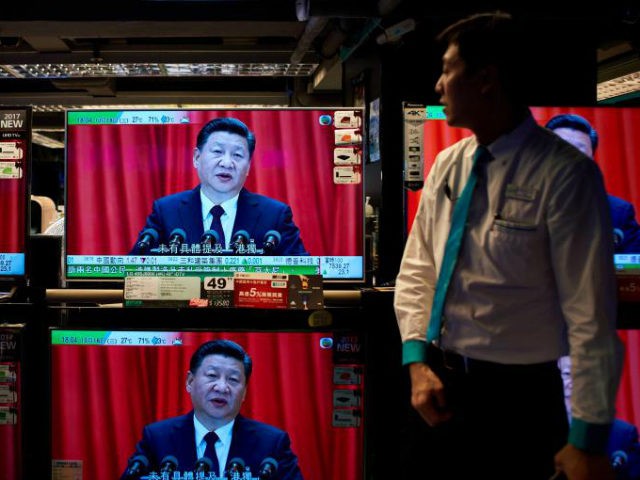China’s state-run Global Times on Tuesday provided an amusing demonstration of how closely Chinese Communist propagandists study left-wing American talking points by railing against the menaces of populism and nationalism supposedly flourishing under U.S. President Donald Trump and predicting the 2020 election could spark a new American civil war.
The most amusing thing about this editorial tirade was the source. China is among the most nationalist, chauvinist, protectionist, and frankly racist nations on Earth, but just as it gets a pass from the environmentalist movement for its massive and growing carbon emissions, it assumes the international Left will refrain from criticizing it for nationalism or racism. A nation that was able to get dozens of Muslim nations to declare themselves untroubled by China herding the Muslim population of Xinjiang province into concentration camps for re-programming has every reason to think it can get away with such hypocrisies.
Thus the Global Times wrung its hands about the shift away from globalism to state sovereignty and national self-interest and worried about the health of American democracy, which it treats like cancer on its own shores:
The waves of anti-globalization and populist movements, which are marked by Donald Trump being elected US President, cast a shadow of unilateralism and protectionism on the final years of the second decade of the 21st century. World politics is shrinking from an interdependent global village to separate states. This tendency, despite not completely mainstream, is alarming. In the first year of the 2020s, the US remains as the top factor strangling international relations.
It implies that as US president, Trump has broken the common features for which US politics was known. First, US presidential election and the rule of the candidate who comes to power are no longer separate. In previous elections, candidates used to spout diplomatic rhetoric in a bid to win the elections, but when they took office, they exercised discretion in carrying out campaign promises, especially those that were considered controversial. However, Trump sticking to fulfilling his election pledges since taking office has erased the ambiguity of US politics.
Second, the legitimacy and vitality of US democracy are under unprecedented challenges. Within the three years of the Trump administration, there have never been so many voices questioning whether US diplomacy remains influential. Some people condemn Trump as a fascist; some believe the US is becoming a socialist country; while most Americans regard the current US predicament as unacceptable, they are pessimistic and confused about the future of their country.
Here the Global Times was picking up on a common talking point in the online American left, which likes to pretend President Barack Obama never happened and Donald Trump is the first president to rule by “pen and phone.” To take a recent example:
One less-discussed difference between Warren/Sanders and Biden is that they’d walk right through the door Trump opened for executive power use. Biden is inclined to close the door and install new locks. https://t.co/aKmD0AXdw3
— Dave Weigel (@daveweigel) January 14, 2020
Citing a poll from the Pew Research Center that Democrat and Republican voters view each other as too “extreme, unpatriotic, and immoral,” the Global Times predicted disaster during and after the 2020 election:
This will lead to the disruption of order during elections. This outcome is also closely related to whether the election results will be accepted by American people. A peaceful transition of government has always been a prominent feature of US democracy that Americans are proud of. However, more and more Americans have started to question it.
Based on a poll carried out by IPSOS in 2019, only 53 percent of the Americans participated in the survey were confident that the 2020 presidential election will be fair. After the Ukrainegate scandal, people who believe the election will be manipulated are increasing. What could possibly worry the Democrats even more is that if Trump fails to win the second term, he is very likely to reject the election result.
This was topped off with an appeal to the Left’s fixation on “white supremacy” and amusing non-sequiturs about how Trump will fight hard to win re-election and will have “tremendous influence on U.S. politics and society” after he leaves office – as if previous U.S. presidents played softball in the re-election bids and quietly vanished without any lasting influence when they were defeated.
The overall thrust of the Global Times editorial was how American democracy represents unpredictability, instability, and “risk,” while China offers stability and globalism. Authoritarian states always tout their stability and mock democracies for being foolish enough to allow voters to impose short terms on their national leaders.
Sadly, democracies often have crises of confidence before elections, stoked by fearmongers who spread wild tales about defeated politicians refusing to leave office and declaring themselves dictators – a warning that was sounded about Trump, Obama before him, and George W. Bush before him. To the authoritarian mind, democracy looks like such a ridiculous gamble that it simply has to fail eventually.
As for the movement away from globalism, it is no wonder China would want to perpetuate a system that has rewarded it so handsomely and allowed it endless opportunities to renege on its agreements.
International elites love to tout the virtues of multilateralism over unilateralism, but the truth dawning on more and more people around the world is that getting the political class of one country to respect the sovereignty of its citizens and work energetically on their behalf is very difficult; getting the elite of one country to fully respect the citizens of another and look out for their interests is a lot to ask. The larger government grows, the less responsive it becomes, and trans-national globalist entities are the least responsive of all.
The American people are certain to argue vigorously about who their next president should be. At least they have something to say about it.

COMMENTS
Please let us know if you're having issues with commenting.